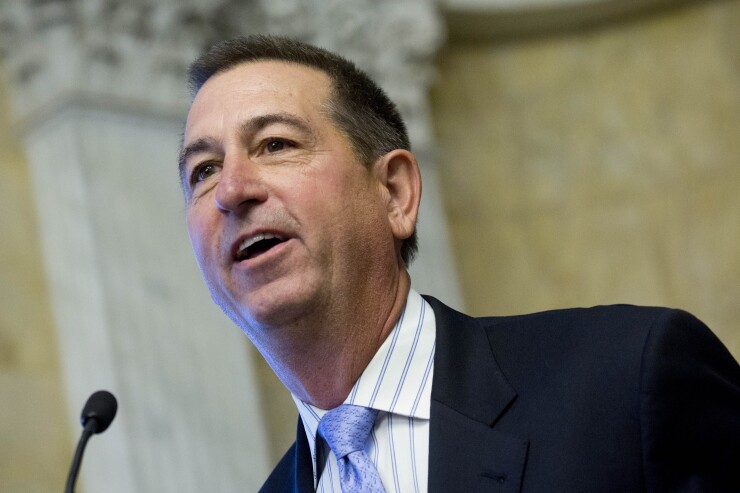The once-close relationships between banks and payday lenders that fell out of favor with Washington regulators more than a decade ago may not be poised for a comeback after all.
Back in March, the Office of the Comptroller of the Currency announced the termination of a 2002 consent order with Ace Cash Express, an Irving, Texas-based payday loan chain, in a decision that both critics and supporters of payday lending saw as a reversal of the regulatory tide.
The 16-year-old consent order had been viewed as a key step in then-Comptroller John D. Hawke Jr.’s push to end rent-a-bank partnerships, under which payday lenders used bank charters to avoid state interest rate caps.

So the recent decision to terminate the Ace Cash Express consent order
But last week the OCC threw cold water on the possibility that rent-a-charter partnerships will stage a revival. In a bulletin that
“We don’t believe,” Otting said during a call with reporters, “that an institution should effectively lend its charter out to a vendor.”
The language in last week’s bulletin was meant to signal that a return to the rent-a-charter arrangements of the early 2000s would be unacceptable to the OCC, according to a source familiar with the thinking of the agency’s leaders.
This source stated that the OCC’s position was informed by discussions with community groups and other policy experts.
Throughout Otting’s six-month tenure, the OCC has won little praise from consumer advocacy groups, but the National Consumer Law Center commended the agency for clarifying that it does not plan to reverse its longstanding stance on bank partnerships with payday lenders.
“Since 2003, national banks, which are regulated by the OCC, have stayed out of rent-a-bank lending, and this bulletin is a signal that it must stay that way,” Lauren Saunders, the consumer advocacy group’s associate director, said in a press release.
Rent-a-bank arrangements became prominent in the early 2000s, as payday lenders took advantage of banks’ authority to apply the interest rate rules of their home states to consumer loans made in other states.
The partnerships, which were often pursued by small banks with headquarters in states that had permissive rules, enabled payday lenders to operate in some jurisdictions where they otherwise would have not been allowed.
But then in 2003, Hawke told payday lenders, “Stay the hell away from national banks.”
For a couple of years, payday lenders turned to state-chartered banks, since their regulator, the Federal Deposit Insurance Corp., was seen as more permissive. By late last decade, payday lenders had largely abandoned their pursuit of bank partnerships.
One question that arose from the language in the OCC’s bulletin was whether it could be used to attack partnerships between banks and online lenders that typically offer consumer loans at interest rates well below those of payday lenders.
Many firms in this newer crop of online lenders have partnered with banks in order to avoid having to get licenses from all 50 states.
While lawyers who represent online lenders expressed concern about the potential implications of the language in the OCC’s bulletin, the agency sought to signal that the document was not meant to be detrimental to partnerships between banks and online lenders.





